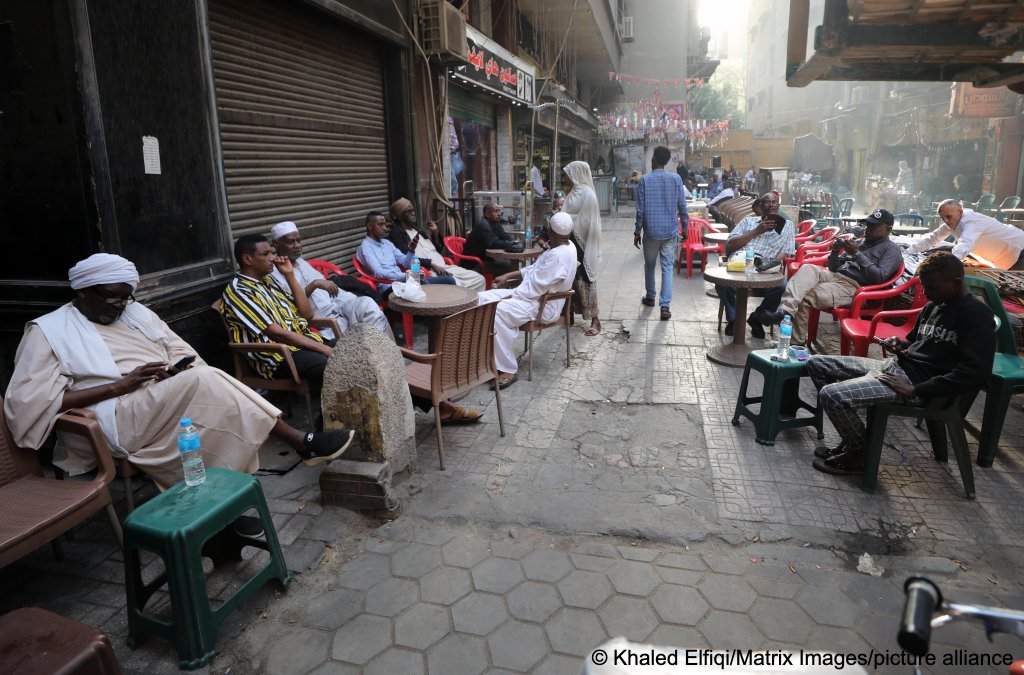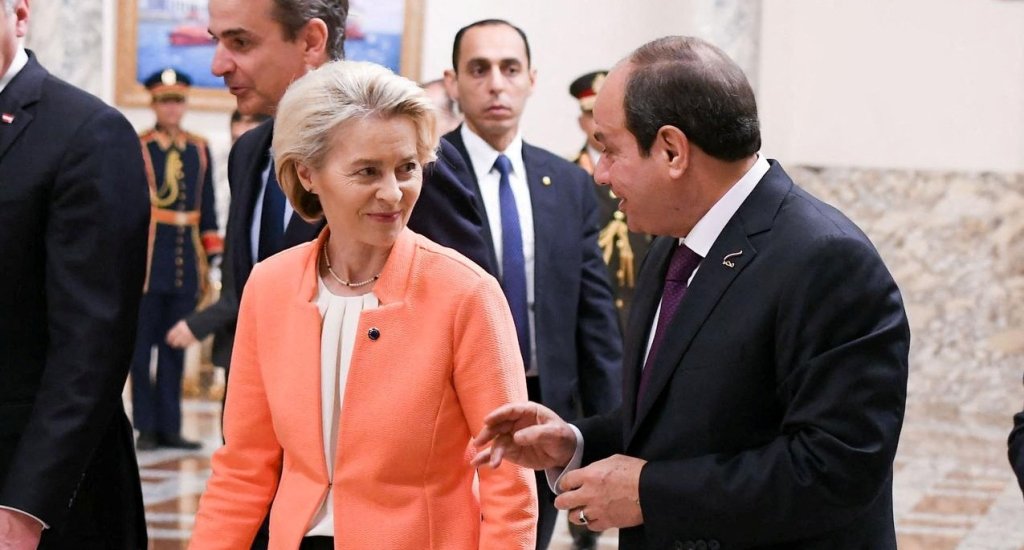The UNHCR says it has been forced to suspend its programs in Egypt due to serious budget cuts. The measures will mostly affect people who rely on the UN body for vital healthcare needs, in particular those fleeing the war in Sudan.
The UN refugees agency in Egypt (UNHCR) has said it has received less than half of its 135 million dollar (around 125 million euros) budget to help nearly one million registered refugees and asylum seekers from 60 countries residing in Egypt this year.
The majority of those seeking protection in Egypt come from neighboring Sudan, where a two-year civil war has displaced about 12 million people in total, with over a quarter of them crossing borders to seek safety elsewhere. In Egypt alone, there are an estimated 1.5 million people who fled from Sudan, but only about 670,000 of them are registered with UNHCR.
"The lack of available funds and deep uncertainty over the level of donor contributions this year has forced UNHCR to suspend all medical treatment for refugees in Egypt except emergency life-saving procedures, affecting around 20,000 patients," the UN agency said in a public statement.
No more insulin or beta blockers
UNHCR public health officer Jakob Arhem added that without the intervention of the agency's health services, some patients "will not be able to find the means to pay for health care themselves and they will get sicker, weaker and many will die."
Among the treatments to be axed for refugees and asylum seekers in Egypt are heart surgeries, cancer treatments as well as standard medication protocols for more common ailments such as high blood pressure and diabetes.
Arhem added that registered refugees have been granted access to Egypt's national health system, but stressed that very few of them can actually afford the fees that are associated with making use of that system.
"UNHCR set up programs that make certain health services available to refugees that they otherwise would not afford," he said in a UNHCR press release.
"To shut down activities that you know are life-saving is very hard, and the very opposite of what anyone wants to do who has chosen to work as a humanitarian."
Read Also'Sudan is trapped in a nightmare' – extreme violence drives record refugee exodus, UN says
Cuts targeting the most vulnerable people
UNHCR says that its support role in Egypt has helped some of the most vulnerable displaced people there, including unaccompanied minors and survivors of rape and torture.
"[W]ithout an urgent increase in funding, even these programs are under threat," UNHCR emphasized.

Since the war in Sudan started, the number of refugees in Egypt has tripled, says UNHCR Child Protection Officer in Egypt Farah Nassef, putting a considerable strain on public infrastructure in the country as well.
With the conflict in Sudan affecting the entire region and putting South Sudan on the cusp of war as well, there could be even more migrants pouring into Egypt in dire need of help, including medical attention.
"You see people on some of the worst days of their lives, and often you cannot help them with everything they ask for, or the support you can provide is simply not enough," Nassef said.
Consequences of US cuts
In addition to the suspension of nearly all aid from the US under the new administration of President Donald Trump, other donor nations have also announced cuts to their overall development aid funding, including the UK and Germany.
Previously, the US funded around 40 percent of the total budget made available to UNHCR, donating over 2 billion dollars (around 1.85 billion euros) to the agency.
According to UNHCR, Germany was its second-largest donor, with funds given by the European Union taking third place.
Since the freezing of US funds, the UNHCR cuts in Egypt mark the first concrete announcement of measures that had to be taken in response to the lack of funds. Previously, the UNHCR had warned that Trump's cuts will have far-reaching effects.
The agency has also had to cut around 400 jobs globally from its overall workforce of roughly 20,000 people.
Read AlsoUS aid cuts could lead to more refugee movements, migration to Europe
EU-Egypt deal
A year ago, in March 2024, the EU reached a 7.4 billion euro deal with Egypt, aimed at supporting the country but also at helping it manage migration. At least 200 million euros of the deal was earmarked for migration management.
The partnership agreement focused on cooperation in a number of areas, from political relations to economic stability, sustainable investment and trade, food security and climate change, as well as migration.
When it comes to migration governance, support from the EU was offered to cover a range of programs including legal migration pathways and a scheme called "Talent Partnerships".
Support was also put in place to tackle the root causes of migration, combating migrant smuggling and trafficking, strengthening border management, and managing migrant return and reintegration, according to a joint declaration.

Unlike in the case of other African countries such as Libya, Tunisia, or Senegal, Egypt's maritime borders are already well guarded, according to a report commissioned by the EU Asylum Agency (EUAA), and most Egyptians trying to reach Europe travel to Libya and then attempt to cross the Mediterranean from there.
On the situation of hundreds of thousands of migrants and asylum seekers currently in Egypt, the new agreement stipulated that the EU will continue to support the government's efforts to host them, and both sides also state their commitment to protecting the rights of migrants and refugees.
Egypt already under-resourced a year ago
Organizations that work with migrants and refugees already worried about the EU-Egypt deal when it was signed, saying that Egypt was already dangerously under-resourced. Since then, the numbers arriving have increased.
Migrant and human rights groups were worried last year that Sudanese refugees in Egypt would be at particular risk under the EU deal. Among the fears is that they could be subject to expulsions by border guards, as happened in Tunisia.
"We already see Egypt keeping the border closed for refugees from Sudan. The pressure to ward off refugees will only increase as a result of these deals," the Dutch Refugee Council warned at the time.
It also urged the EU to invest in "a working asylum system, including decent reception and real opportunities to build a life in the country."
Andrew Geddes, the director of the Migration Policy Center at the European University Institute, is not optimistic on this score. Speaking to Euronews, he noted that most refugees in Egypt are dependent on humanitarian assistance, live in very bad conditions and have high unemployment levels.
"It's unlikely that the resources provided by the EU will be directed by the Egyptian authorities to improve this situation," Geddes said.
"The situation (for them) may deteriorate and, for those that do try to move, the journeys may become even more dangerous and deadly.”
IOM also affected by cuts
Against this year's similar, but worsening, budgetary and political backdrop, the UN migration agency IOM also said that it expected its programs to be affected in the coming months and years.
IOM Director-General Amy Pope said there would be a projected shortfall in its budget of over 1 billion dollars (just under a billion euros), from 4 billion dollars (around 3.7 billion euros) to under 2.9 billion dollars (around 2.6 billion euros).
Pope added that further cuts were to be expected in 2026, highlighting that this will affect migrants around the world, and could eventually have an effect on paths displaced people might take out of certain affected regions and towards Europe in the future too.
Read AlsoMigration to Europe – 2024 in pictures
with AFP, Reuters, dpa
